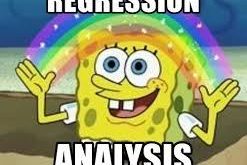Amine Kakabaveh är kurd med rötter i Iran … I somras uteslöts hon ur Vänsterpartiet efter flera års konflikt med partiledningen. Som riksdagsledamot drev hon stenhårt frågor om hedersförtryck – något som man i vänstern länge inte vågade tala högt om. – De sa hela tiden till mig att jag underblåser rasism när jag pratar om att flickor blir slagna och bortgifta. Men det är ju de som tiger som underblåser rasism. Tack vara att de varit så fega har SD vuxit … Rädslan för sanningen...
Read More »Experiments in social sciences
Experiments in social sciences How, then, can social scientists best make inferences about causal effects? One option is true experimentation … Random assignment ensures that any differences in outcomes between the groups are due either to chance error or to the causal effect … If the experiment were to be repeated over and over, the groups would not differ, on average, in the values of potential confounders. Thus, the average of the average difference of...
Read More »Quinn Slobodian and the birth of neoliberalism
Quinn Slobodian and the birth of neoliberalism [embedded content] It is a measure of the success of this fascinating, innovative history that it forces the question: after Slobodian’s reinterpretation, where does the critique of neoliberalism stand? First and foremost, Slobodian has underlined the profound conservatism of the first generation of neoliberals and their fundamental hostility to democracy. What he has exposed, furthermore, is their deep...
Read More »On the impossibility of efficient markets
On the impossibility of efficient markets In general the price system does not reveal all the information about “the true value” of the risky asset … The only way informed traders can earn a return on their activity of information gathering, is if they can use their information to take positions in the market which are “better” than the positions of uninformed traders. “Efficient Markets” theorists have claimed that “at any time prices fully reflect all...
Read More »Friday on my mind
Friday on my mind [embedded content]
Read More »Dynamic and static interpretations of regression coefficients (wonkish)
Dynamic and static interpretations of regression coefficients (wonkish) When econometric and statistical textbooks present simple (and multiple) regression analysis for cross-sectional data, they often do it with regressions like “regress test score (y) on study hours (x)” and get the result y = constant + slope coefficient*x + error term. When speaking of increases or decreases in x in these interpretations, we have to remember that it is a question of...
Read More »Why all RCTs are biased
Why all RCTs are biased Randomised experiments require much more than just randomising an experiment to identify a treatment’s effectiveness. They involve many decisions and complex steps that bring their own assumptions and degree of bias before, during and after randomisation … Some researchers may respond, “are RCTs not still more credible than these other methods even if they may have biases?” For most questions we are interested in, RCTs cannot be more...
Read More »Chicago economics — only for Gods and Idiots
Chicago economics — only for Gods and Idiots If I ask myself what I could legitimately assume a person to have rational expectations about, the technical answer would be, I think, about the realization of a stationary stochastic process, such as the outcome of the toss of a coin or anything that can be modeled as the outcome of a random process that is stationary. I don’t think that the economic implications of the outbreak of World war II were regarded by...
Read More »Et maintenant
[embedded content]
Read More »Economists saving the world …
Economists saving the world …
Read More » Lars P. Syll
Lars P. Syll







